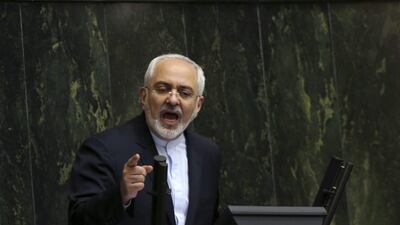TEHRAN // Iran’s top diplomat Mohammad Javad Zarif will visit Kuwait, Qatar and Iraq this weekend, the Isna press agency said on Friday, following a landmark nuclear deal between Tehran and world powers.
The accord, struck on July 14, which imposes certain controls on Iran’s nuclear programme in exchange for a lifting of crippling economic sanctions, is expected to form the basis of discussions during Mr Zarif’s trip.
Arabian Gulf countries led by Saudi Arabia have been quick to voice concern over the agreement, which will see a progressive easing of international sanctions on Iran in place since 2006.
They fear the deal could bolster their Shiite-dominated adversary, which stands accused of interfering in countries such as Iraq, Syria and Yemen.
Mr Zarif is expected to visit the holy Shiite town of Najaf in Iraq on Sunday before heading to Baghdad, according to ISNA.
The Iranian foreign minister will return to Tehran next week where he will host talks with EU foreign affairs chief Federica Mogherini before meeting his French counterpart Laurent Fabius.
Meanwhile, Mr Zarif’s US counterpart, John Kerry, said on Friday it would be embarrassing to him and a blow to US credibility on the world stage if Congress rejects the Iran nuclear deal.
“Do you think the ayatollah is going to come back to the table if Congress refuses this and negotiate again?” the US secretary of state told a well-heeled audience at the Council of Foreign Relations in New York.
Mr Kerry has spent recent days trying to sell the hard-fought deal to sceptical Americans as the Republican-majority, 535-member Congress has 60 days to review the deal.
Congress can pass a motion of disapproval, which president Barack Obama can veto. An override of the veto requires two-thirds approval in both the House and Senate.
“Do you think that they’re going to sit there and other people in the world are going to say, ‘hey let’s go negotiate with the United States, they have 535 secretaries of state’?,” Mr Kerry said.
“I mean please. I would be embarrassed to try to go out. What am I going to say to people after this as secretary of state. ‘Come negotiate with us.’ ‘Oh Can you deliver?’ Please.”
Mr Kerry faced blistering criticism on Thursday that he had been “fleeced” and “bamboozled” by Tehran, as he defended the Iran nuclear deal publicly on Capitol Hill.
He encountered a tsunami of scepticism from Republicans on the Senate Committee on Foreign Relations, during a marathon four-and-a-half-hour hearing.
The UN security council unanimously endorsed the agreement on Monday, paving the way to the lifting of punishing economic sanctions.
The deal was reached in Vienna last week after tough negotiations between Iran and the permanent Security Council members — Britain, China, France, Russia and the United States — plus Germany.
* Agence France-Presse

